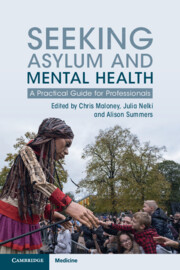Book contents
- Seeking Asylum and Mental Health
- Seeking Asylum and Mental Health
- Copyright page
- Contents
- The Authors
- Foreword
- Acknowledgements
- Glossary
- Introduction
- 1 Why do people seek asylum? The global context
- 2 Seeking asylum in the United Kingdom
- 3 Seeking asylum and mental health
- 4 Access to mental health care
- 5 Assessing mental health needs
- 6 Interpreting assessment findings
- 7 Formulation and diagnosis
- 8 Common diagnoses
- 9 Intervention: the essentials
- 10 Specific interventions
- 11 Children, families, and young people
- 12 Records and reports
- 13 Improving mental health services
- 14 Therapeutic complexity
- 15 Working with people seeking asylum
- Some resources
- Index
- References
9 - Intervention: the essentials
Published online by Cambridge University Press: 26 August 2022
- Seeking Asylum and Mental Health
- Seeking Asylum and Mental Health
- Copyright page
- Contents
- The Authors
- Foreword
- Acknowledgements
- Glossary
- Introduction
- 1 Why do people seek asylum? The global context
- 2 Seeking asylum in the United Kingdom
- 3 Seeking asylum and mental health
- 4 Access to mental health care
- 5 Assessing mental health needs
- 6 Interpreting assessment findings
- 7 Formulation and diagnosis
- 8 Common diagnoses
- 9 Intervention: the essentials
- 10 Specific interventions
- 11 Children, families, and young people
- 12 Records and reports
- 13 Improving mental health services
- 14 Therapeutic complexity
- 15 Working with people seeking asylum
- Some resources
- Index
- References
Summary
The chapter considers essential components of any effective treatment or intervention, and the need to adapt standard approaches for people seeking asylum, how this may be done, and the limitations of the ‘evidence base’. Barriers to accessing intervention are discussed, and the need for services that address the complexities of interpretation and cultural differences.
Therapeutic relationships are reviewed, andcollaborative work is emphasised.
Therapeutic organisation is also important: early intervention, a conducive setting, continuity of care, and minimising pitfalls of onward referral. Mental and physical health care should be integrated as far as possible, with attention to communication with other professionals and feedback to the client. Consideration is given to how to identify starting points for an intervention. Interventions for specific groups are reviewed, including gender and sexuality, and related to torture, trafficking and sexual violence. Work in inpatient settings and immigration removal centres isconsidered. Remote working is reviewed, as is the possible therapeutic role of medicolegal assessment. Ways of ending treatment constructively are discussed.
Keywords
- Type
- Chapter
- Information
- Seeking Asylum and Mental HealthA Practical Guide for Professionals, pp. 166 - 183Publisher: Cambridge University PressPrint publication year: 2022



